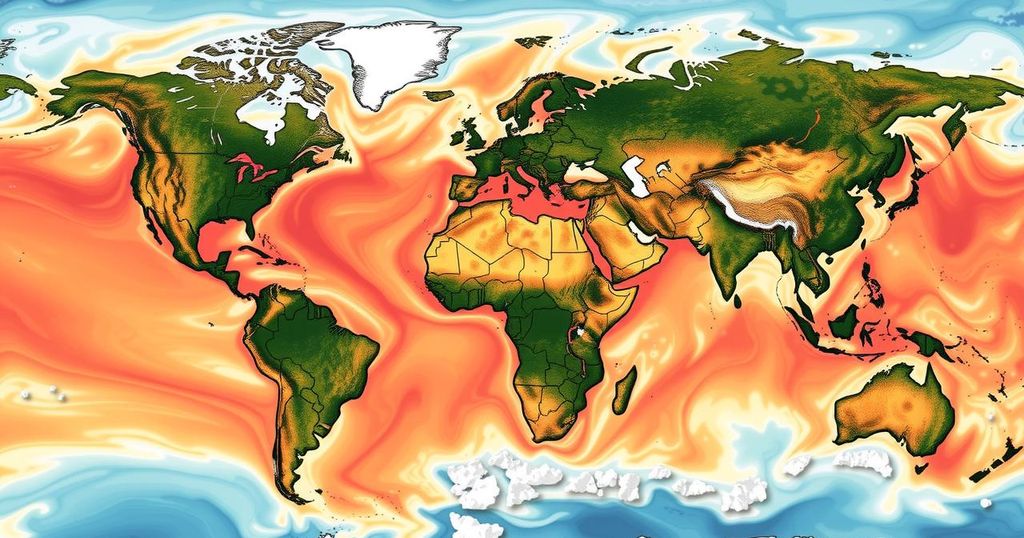Climate Change Report: A Record-Breaking 2024

In 2024, NOAA reported the highest global temperatures on record, with average surface temperatures 2.32°F above the 20th-century norm. Ocean heat content also peaked, while Antarctic sea ice extent hit its second lowest levels. A total of 85 named tropical storms occurred globally, slightly below average, yet the North Atlantic reported above-average activity. December 2024 maintained warmth with significant anomalies in snow cover and sea ice extent.
The year 2024 has been marked as the warmest year on record according to the National Oceanic and Atmospheric Administration (NOAA), which has documented global temperatures since 1850. Specifically, global surface temperatures were recorded at 2.32°F (1.29°C) above the 20th-century average, surpassing the previous year’s temperatures by 0.18°F (0.10°C). Notably, upper ocean heat content—the heat stored within the top 2000 meters—also reached unprecedented levels, supporting claims of ongoing climate change.
Furthermore, the Antarctic sea ice extent hit its second lowest recorded level during February and September. Across the globe, 85 named tropical storms occurred, with activity in the North Atlantic slightly exceeding average expectations. Despite a decrease in overall storms, 18 tropical storms were classified as hurricanes, with five attaining Category 5 status, indicating significant cyclone activity.
Regions such as the Arctic, northeastern North America, and eastern Europe experienced remarkable warm anomalies, contributing to record temperatures across multiple continents. The Northern Hemisphere witnessed below-average snow cover, while both Arctic and Antarctic sea ice extents ranked amongst the lowest recorded since tracking began.
In December, temperatures remained extreme, with a global average of 2.27°F (1.26°C) above the 20th-century average, making it the second warmest December on record. Snow coverage in the Northern Hemisphere was at its 13th-lowest extent, with the Arctic experiencing its lowest December extent on record. Only one named tropical storm, Tropical Cyclone Chido, formed this month, impacting regions of southeast Africa. NOAA scientists continue to analyze these environmental patterns to foster informed decision-making and policy development relating to climate change.
The ongoing analysis of climate change underscores alarming trends in global temperatures and natural phenomena. Over the past two decades, climate scientists have noted an unprecedented rise in global temperatures, largely attributed to human activities and greenhouse gas emissions. This context sheds light on the implications of the 2024 climate data released by NOAA, highlighting the sustained increase in ocean heat content, melting ice caps, and extreme weather events as both urgent and significant indicators of global change. With comprehensive records dating back to 1850, NOAA’s findings are increasingly critical for understanding and addressing the ramifications of climate change.
In conclusion, the year 2024 has set a concerning precedent as the hottest year recorded, highlighted by significant anomalies in global temperature, ocean heat content, and polar ice extent. With record-breaking data collected by NOAA, the implications of shifting climate patterns continue to necessitate urgent action and comprehensive climate strategies. Understanding these trends is crucial for developing informed policies to mitigate the effects of climate change and protect our planet’s future.
Original Source: www.ncei.noaa.gov






